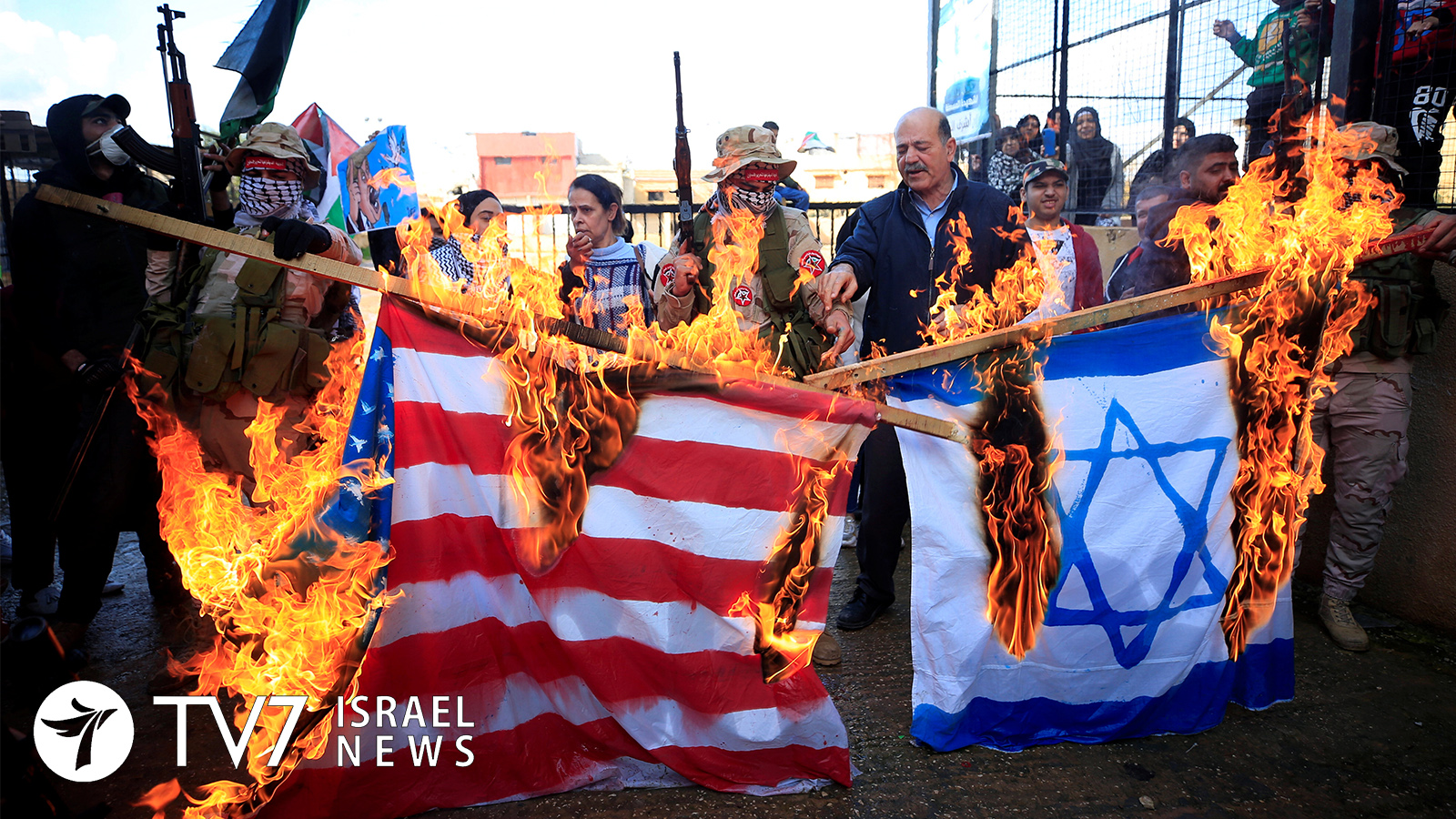Ongoing street protest in Lebanon has taken what may be a temporary twist, with fury against U.S. President Donald Trump’s Middle East peace plan taking center stage.
Palestinian refugees in Beirut angrily rejected the so-called ‘Deal of the Century‘ announced by Trump on Tuesday to resolve the conflict between Palestine and Israel. Others in the South Lebanese Palestinian camp of Ain al-Hilweh near Sidon burned swastika-covered posters depicting U.S. President Donald Trump and Israeli Prime Minister Benjamin Netanyahu as Nazis, as well as the flags of both nations. Armed and masked members of the Democratic Front for the Liberation of Palestine, a radical Marxist militant group, waved M-16 semi-automatic rifles in the air. One protester Bushra al Amin told Reuters that Trump’s decision was “altogether inadmissible,” and that “we refuse it because Jerusalem is the capital of Palestine, and it will stay the capital of Palestine.”
The Secretary General of the Palestine Liberation Organization (PLO) and Fatah in Sidon, Maher Chabayta, said “we will topple this deal, whatever the price” just as previous plots against the Palestinian cause have been “toppled,” because “in Fatah and in the PLO, we are a project of martyrdom or success – so we will keep going until martyrdom or success.”
At the North Lebanon Palestinian Baddawi Camp in Tripoli, protesters held a sign reading in Arabic: “Our Palestinian people, its factions and institutions, rejects the deal of the century, and it will be shattered on the base of its mighty resistance.” Others marched while chanting against Trump’s plan, while waving Palestinian flags. Images of late Palestinian President Yasser Arafat and his successor Mahmoud Abbas were printed on posters and banners. Abou Adnan al Oudi, of the Central Committee of the Popular Front, declared, “They won’t be able to drop the right of the refugees to return (to Palestine), and they (the Jews) won’t be able to have Jerusalem. Jerusalem will stay Arabic, Muslim and Christian.”
Meanwhile, anti-government protests that have surged across Lebanon since October show no sign of abating. Activists identified with “the October Revolution” posted photos on Twitter of what they described as “a fortified zone” in Beirut of security walls designed to keep them from demonstrating in front of the parliament and government offices. Sarah el Deeb tweeted that “some roads closed by protesters for a largely symbolic sit in.” Others posted video of protesters clashing with police in the capital on Wednesday, including what appeared to be the launching of fireworks at security forces. On Tuesday, hundreds of people gathered at the central Martyr’s Square to rally against its reopening in the heart of the city, which had been closed to traffic as it was occupied by the protesters.
The country suffers from high unemployment, slow growth and one of the highest debt ratios in the world – with the debt burden reaching $86.2 billion in the first quarter of 2019, according to the Finance Ministry. A fresh wave of protests erupted this past week against the new government of premier Hassan Diab, who assumed office on January 21. Diab’s cabinet took office last week with the backing of Iran-backed Hezbollah and its allies, after Saad al-Hariri quit as premier in October amid protests against the ruling elite.
Attorney Tarek Itani, who is a human rights activist based in Beirut, told VOA that “Hezbollah and its allies formed this government; the protesters don’t have any trust in it. They are saying they have formed a government of technocrats, but they brought in their own people with new faces,” but that “Nothing changed.” Itani added that the protesters are preparing to organize new rallies on the streets of Beirut and other cities in the upcoming weeks, saying that “their main demand” is the holding of new parliamentary elections and formation of “an entirely new government that is capable of introducing tangible reforms. “We have no trust in the current political system,” he said, adding that “The Lebanese people don’t want to pay the price anymore for the corruption of the political parties and their mismanagement of the financial resources of the country.”
Meanwhile, Lebanon saw a first glimmer of economic hope when its $1.2 billion March 2020 bond rallied by a record level yesterday, in a possible indication of rising investor optimism it could be repaid despite the country’s worst financial crisis in decades. The bond, which is Lebanon’s most immediate debt maturity, surged 4.1 cents in what was its biggest daily gain on record – even though it is still worth only 80.5 cents on the dollar.
On Wednesday (January 22), Prime Minister Diab asked the government and financial institutions for a plan to restore confidence and ease a liquidity crunch.
The head of Lebanon’s banking association who attended Wednesday’s meeting expressed confidence while speaking to Reuters. “With the formation of the new cabinet, we believe that the path to recovery has begun,” said Salim Sfeir. The “pace” of such a recovery “is linked to cabinet’s reforms and the political stability,” he said, adding that “We have sensed that the government is aware of the financial challenges, and has made the economic recovery a top priority.”
